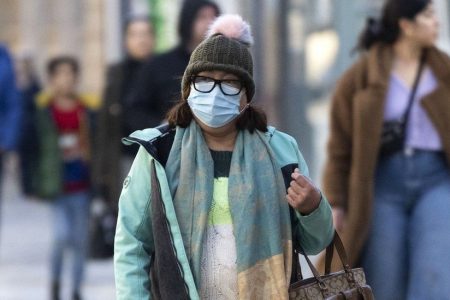No further Covid restrictions will be announced in England on Monday, the BBC understands.
Prime Minister Boris Johnson is being briefed on the latest Covid data this afternoon, after two days without published figures.
Ministers are expected to continue regular meetings with scientists, and keep the data under review.
Meanwhile, Scotland and Northern Ireland have tightened rules for a second day.
In both nations hospitality venues have returned to table service only and social distancing has been reintroduced in several settings.
Nightclubs have also been closed in Scotland, Northern Ireland and Wales.
BBC political correspondent Ione Wells said the lack of new legal restrictions for England on Monday did not rule out more guidance, or stronger language urging people to be careful.
- What are the Covid rules now?
- How to look after yourself if you get Covid
- Omicron: Good news, bad news and what it all means
“We know two jabs don’t give you enough protection against Omicron so whether it’s your first, second or booster jab I urge you to book an appointment now.”
Data on daily Covid cases has not been published over Christmas, but the UK saw several days of record cases as Omicron took hold in the run-up to the festive period, with 122,186 cases reported on 24 December.
Downing Street previously said it would not hesitate to act after Christmas if necessary.
England’s current guidance – known as Plan B – requires people in England to work from home, wear face coverings in shops and other public settings and present Covid passes to gain entry to large events.
The briefing by scientific advisers on Monday is one of a regular series of updates given to the prime minister, and he has not yet called a cabinet meeting or announced a recall of Parliament.
MPs have been promised a vote if it is decided fresh legal measures are needed, after Mr Johnson suffered the largest rebellion since he became PM over the introduction of Covid passes earlier this month.
Early findings last week suggested people infected with the fast-spreading Omicron variant were less likely to be admitted to hospital – although a range of factors will likely be examined when looking at the case for restrictions.

Omicron: What we know so far
- This variant is very contagious – it spreads faster than others and can infect people even if they are fully vaccinated
- Vaccines and boosters are still essential – they do a great job at protecting against severe disease that could put you in hospital
- It is milder – if you catch it, the risk of needing hospital treatment is up to 70% lower than with previous variants – but that is largely because many of us have built up immunity from vaccines and past infections rather than changes to the virus
- Even if Omicron is milder, because it is more contagious a large number of people will catch it and some will still become very ill, which puts pressure on the NHS.
Read more here.

The UK has massively ramped up its booster programme in response to Omicron, which was first identified in South Africa just one month ago.
A record 968,665 booster jabs and third doses were reported in one day last week, and the NHS said a further 1.5 million vaccination slots were available to book in England in the coming days.
In a tweet, the prime minister said: “We know two jabs don’t give you enough protection against Omicron so whether it’s your first, second or booster jab I urge you to book an appointment now.”
Meanwhile, there were no walk-in PCR tests available to book in England for a few hours on Monday due to “high demand”.
Appointments were temporarily unavailable in every region of England, but the UK Health Security Agency said the issue was now resolved.
